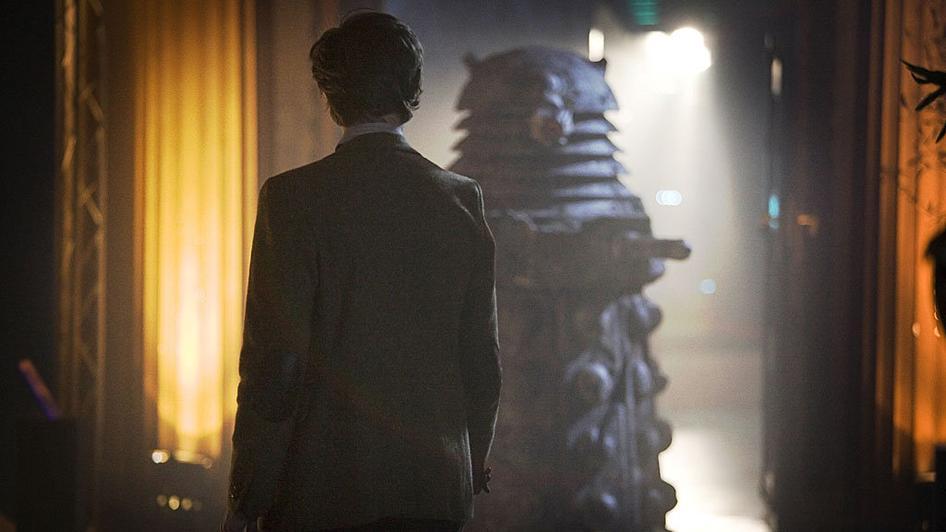Clara and student Courtney Woods send the world a video message from The Moon in 2049, giving them 45 minutes to choose between humankind and an innocent life. Back at Coal Hill School in the present day, Courtney is acting out following The Doctor’s rejection, and he agrees to make her the first woman on the moon to prove she’s ‘special’. The TARDIS lands on a Moon shuttle full of nuclear bombs in 2049. The Doctor, Clara and Courtney meet Captain Lundvik and two ‘third-rate astronauts’, sent on a mission to destroy The Moon as high tides engulf the earth.
On a Mexican moon base, they discover The Moon’s mass has increased drastically and that the colonists have been entombed in spiderwebs. The other astronauts are killed by spider-like aliens, and Courtney narrowly avoids death by spraying it with disinfectant. The Doctor discovers they are in fact germs and that The Moon is a 100-million-year-old egg ready to hatch. He leaves Clara, Courtney and Lundvik to decide its fate, at which time Clara asks the earth to vote with lights. Clara stops Lundvik activating the bomb. The egg hatches, and another drops, stabilising the earth. Angered, Clara leaves The Doctor.
Despite having a concept that sounds like a hastily improvised fairytale, the episode is far more solidly and straightforwardly written than many in this season. It’s paced well with the right balance of suspense and exposition, and the portrayals of the characters are convincing, no matter how incidental they seem. It’s just a shame that there wasn’t more a more plausible science-fiction idea to hang the strong script on, instead of the ‘makeitupasyougoalongeum’ that Terry Pratchett claims has taken over Doctor Who. It’s also disappointing that we have to end on yet another dialogue-heavy scene between The Doctor and Clara.
There’s an interesting spin on the idea of a story set in the near future, with Lundvik reminiscing about Tumblr and the advances of the Mexican space program. Writer Peter Harness also addresses Doctor Who‘s long-standing ‘elephant in the room’ when it comes to time travel, reminding viewers (and hopefully other writers on the series) that the future is also someone else’s past. But there’s a strong sense of déjà vu here, and not just because of the orange spacesuits. The storyline is alarmingly similar to Waters of Mars and The Doctor’s monologues about time are as portentous as ever.
‘Kill The Moon’ deserves credit for developing the relationships of the characters without sacrificing plot, as was the case with ‘The Caretaker’. Clara’s contempt for The Doctor’s condescension and recklessness builds over the episode as events unravel, and Courtney was a great vehicle for bringing those feelings to the fore. Courtney is so intelligently written and played so credibly that it’s a real shame she gets written out at the end of the episode with a garbled piece of exposition. At times, Courtney feels like a more compelling companion for The Doctor than Clara, which should be cause for concern.
Harness does a great job suggesting The Doctor’s manipulative, elitist tendencies without them contaminating his function as the hero. In fact, Harness gets the balance so perfectly that Clara’s walkout seems a disproportionate reaction, and (especially in light of their quick reconciliation) there for the sake of melodrama. Once again, Danny is an observer with a couple of token appearances by phone, which seem only to underline his irrelevance as a recurring character. The separation of Clara and The Doctor in the final third anticipates the way that the two will rarely feature together in the rest of the season.
There’s very little negative to say about the storytelling in ‘Kill The Moon’. The episode is coherent, well-structured and character is held in perfect balance with plot. It’s the most successful the season has been so far at combining a self-contained storyline with the season arc. It is, however, one of those Doctor Who episodes you shouldn’t look at too closely in terms of content. There’s a lot of fantasy disguised as hard science, and there’s nothing new to add to past explorations of ‘undecided’ events of the near future. Still, The Doctor’s character comes over strongly, and for the most part in relation to events instead of clunky dialogue about his morality. Courtney is an excellent addition to the cast, and her presence prevents the adversarial dynamic between The Doctor and Clara getting out of hand, at least until the final scene. Overall, not bad for unadulterated scientific nonsense.

